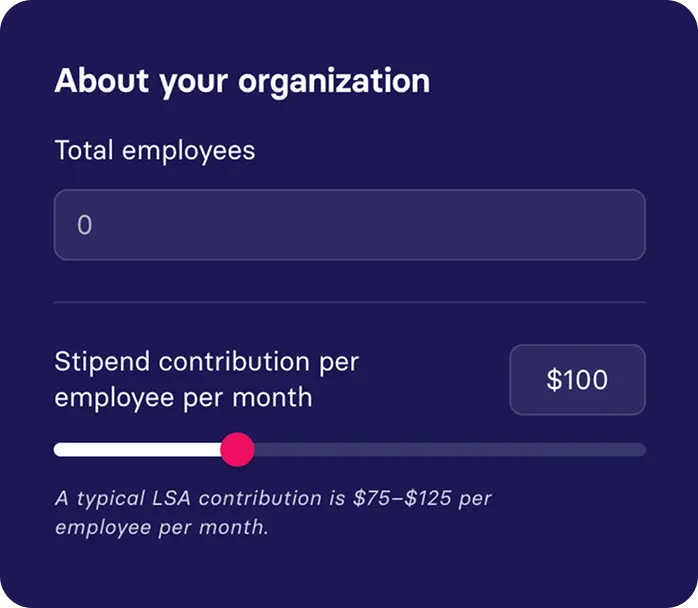In this post
Lorem ipsum dolor sit amet
Lorem ipsum dolor sit amet
At Benepass, we help companies take better care of their employees through flexible benefits that can be easily adapted to meet ever-changing needs. With the Supreme Court’s decision to overturn Roe v. Wade, employers are asking themselves how they can support impacted employees and help them access safe, legal reproductive care.
Many companies like Comcast, Disney, Netflix, and Dick's Sporting Goods are offering this support through a commitment to pay for travel costs if employees need to travel out of state to receive reproductive care.
Benepass’s Healthcare Travel benefit can help employers fulfill their commitment by providing a flexible way to cover these costs without risking compliance or the privacy of their employees. Our product allows employees to access this benefit without spending out of pocket, while also removing the admin and compliance burden of administering a program like this.
How it works
Our goal in offering this benefit is to build a stress-free process for helping employees access critical healthcare. The overturning of Roe v. Wade creates a pressing need for this, but it’s not the only application. Employers can use our Healthcare Travel benefit to support employees who need to travel for a wide range of healthcare needs, whether it’s receiving gender-affirming surgery or consulting with a medical specialist in another state. Here’s how it works:
- We can set up this benefit in a Health Reimbursement Arrangement (HRA) or Lifestyle Spending Account (LSA) format. There are considerations for both approaches, and our team will work with you to design the benefit to meet any unique requirements, including coverage amount, employee eligibility, and tax and compliance implications.
- Employees receive virtual and physical Visa cards they use to spend. There’s no need for them to spend out of pocket, but we support reimbursements if employees prefer to use their personal accounts or if travel costs exceed the stipend amount.
- Our team processes transactions and reimbursements to validate eligibility. This means more privacy for your employees surrounding sensitive medical information, as well as less admin burden for your People and Finance teams.
Here’s how you can take action now
If your company has already announced a response to the Supreme Court decision, here’s what you can do:
- Evaluate your current medical plan’s coverage for reproductive care. Reach out to your carrier to confirm.
- Consider additional areas of coverage your company may want to support, such as medical services not currently covered by your plan, expenses related to accessing out-of-state medical services (for example, transportation, lodging, meals, and child care costs), and coverage for employees who are not enrolled in your medical plan or spouses and partners.
- Consider benefit configuration options and consult legal counsel.
- If you decide to provide additional coverage, choose a benefits administration partner who can work with you with speed, knowledge, and care.
Core compliance and legal questions
There are three core compliance and legal issues at hand in considering this benefit.
1. Is travel to access medical care, such as reproductive care, considered medical spending?
Broadly speaking, yes.
IRS Code Section 213(d) defines medical care as amounts paid:
- for the diagnosis, cure, mitigation, treatment, or prevention of disease, or for the purpose of affecting any structure or function of the body
- for transportation primarily for and essential to medical care
- for certain lodging away from home treated as paid-for medical care
Many employer-sponsored medical plans, whether they are fully-insured or self-insured, already cover travel related to medical care, so consult your insurance company to confirm.
2. If an employer funds the benefit, would it be considered pre- or post-tax?
For an employer-funded benefit to be considered pre-tax, the employer would need to set up a Health Reimbursement Arrangement (HRA).
There are two types of HRAs that employers may offer in this instance.
Group coverage HRA:
- Offered in conjunction with the employer’s group medical plan to reimburse employees for out-of-pocket medical expenses that are not fully covered
- Only available to employees who are enrolled in the employer’s group medical plan, which cannot be a high-deductible health plan
- No limitation on employer contribution
Excepted benefit HRAs:
- Similar to the group coverage HRA, the benefit is medical care that is not covered or not covered fully by the group medical plan
- Available to all employees, regardless of enrollment in the employer’s group medical plan
- Maximum employer contribution of $1,800 per year, though unused amounts may roll over to next year
Alternatively, certain employers may prioritize ease of access for employees above all else. They can consider a broad Healthcare Travel benefit that covers all employees and partners, regardless of the individual’s enrollment in the group medical plan. This benefit includes all transportation, lodging, meals, child care costs, and other expenses associated with out-of-state travel. It would be similar to a Lifestyle Spending Account and be fully taxable.
3. Are there legal risks to the employer?
When establishing any new benefit, employers should be mindful of regulations from the Affordable Care Act, ERISA, HIPAA, and COBRA.
ERISA is a federal law that preempts any state laws relating to employer-sponsored health plans. Courts have typically interpreted that language to bar state laws that dictate what health plans can and cannot cover.
However, there are limitations to the ERISA preemption. ERISA covers self-funded plans, including HRAs, but not fully-insured group plans. ERISA also does not preempt state criminal laws, which may be updated in light of the recent ruling.
We encourage all employers to seek legal counsel to weigh the potential risks before implementing a new benefit.
Responding to your team’s needs moment by moment
Your employees’ needs are never static. The overturning of Roe v. Wade presents a new obstacle to ensuring your employees have equitable access to the healthcare they need. We are committed to delivering flexible benefits that allow people-first companies to meet needs as they continue to change.
If you’re considering helping employees pay for healthcare travel costs in light of Roe v. Wade and want to learn more about our Healthcare Travel benefit, please reach out to us here.
* The information in this document is not meant to be tax or legal advice. You should consult appropriate tax and legal counsel with respect to the applicability of any information provided here to your circumstances.



